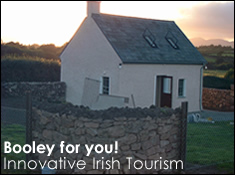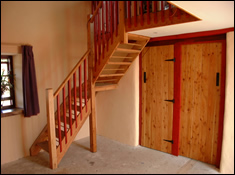- Eco Housing
- Posted
Booley for You!

Of huge importance to our national identity and one of the major features of the rural Irish countryside are the derelict small cottages, scattered across the land, that have long fallen into ruin. Often situated in Irelands most beautiful and remote areas, Terry Cunningham, Rural Enterprise Adviser of the Southern Tipperary office of Teagasc sought to revitalise and fully utilise these charming and unique dwellings from our past.
The Irish Eco-Cottage (Tourism Development) Project aims to create a new, branded, and uniquely Irish product, the EcoBooley Self-Catering Cottage. The overall idea of this project is for the owners of such properties, who are mostly farmers, to reinstate some of those homesteads using only Eco-friendly technologies and materials. Each homestead would be unique, using technologies and materials specific to its particular context. These habitable houses would then be let out as self-catering accommodation to the expanding eco-friendly tourism market. The need for such a project came about following the realisation that unless a real and viable use could be found for some of these abandoned homesteads a great loss of vernacular architecture would take place. Is it possible to reintegrate these properties into modern commercial use without causing damage to their historical worth? Seeing as how tourism can create great and devastating damage to the environment if not properly planned and executed, and that it can destroy the very environment which attracts visitors in the first place was it the most suitable path to follow? Cunningham believed that with the use of Alternative and Intermediate Technology, the houses in remote areas could be rendered very habitable and functional with particular appeal to a new kind of traveller/tourist that was emerging - especially in Northern Europe - who wished to engage in environmentally friendly holidays.
With the cooperation of Teagasc, the Tipperary LEADER group, consultant and enviro-builder Garry Gleeson and in association with Eamonn Looby, a farmer and the property owner a pilot project was carried out during 1999 and 2000 in South Tipperary to investigate how such development and restoration could be implemented and how any difficulties that might arise might be dealt with. The core task of the EcoBooley project was to restore, refurbish and furnish an abandoned cottage in the town land of Ronga, Clogheen at the foot of the Knockmealdown Mountains using only Eco-friendly technologies, such as water power and composting toilets, while still fulfilling all the requirements set out by Bord Failte for a self catering tourist property.
The most immediate problem is that considering the often very remote location of such properties it is rare for them to have either water, gas or electricity connections.
By connecting the house to a water-driven electric turbine, it has been possible to generate up to 1.4kw of power, more than enough for a small double ring and grill, kettle, fridge, lighting throughout, a fan in the composting toilet and other such conveniences. No connection to the National Grid has been necessary.
For the bathroom a dry composting toilet was fitted. Waste matter is disposed to a willow plantation via grease traps that can later be coppiced for firewood. Such firewood can obviously be used to fuel the woodstove, providing heating for the cottage and hot water. Any surplus water from the boiler in the kitchen is pumped through coiled hot water pipes buried in the sand in the wall, acting as a storage heater between the bathroom and downstairs bedroom. To fully ensure heat was retained sheep’s wool was used to insulate the roof and a hemp and lime mix.
Conservation Grade roof-lights were added to increase light, with one small south facing window added to also increase natural lighting in the Kitchen area. Timber from the farm was used whenever possible, especially for the Oak Tiles on the floor of the downstairs bedroom. In fact working closely with the farmer has led to further interest on his part in implementing sustainable practices in his own farming work, a substantial bonus for this any other potential projects.

Whilst initially a once-off project there is now an objective to expand the concept on a co-coordinated nationwide basis considering the successful results obtained in Southern Tipperary. Subject to funding ‘EcoBooley’ could potentially become a branded concept, using advanced systems to maintain the integrity of the product. For example, a scheme of symbols might set out which technologies are recommended, permitted, restricted and prohibited if a homestead is to be marketed under the EcoBooley umbrella.
Information is available at www.ecobooley.com to inform farmers of the costs and issues in restoring old homesteads as EcoBooleys. At a project level, some of the technical information on the pilot project has yet been captured in a technical report. If funding was available to capture this reservoir of knowledge it would contribute to the learning processes of other EcoBooley creators.

